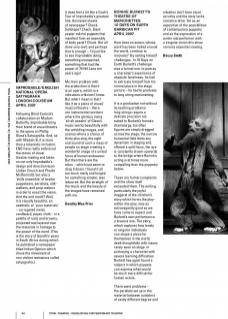How does an auteur, whose work has been hailed around the world, continue to innovate? By setting himself challenges. In 10 Days on Earth Burkett’s challenge was a formal one: to portray a character’s experience of absolute loneliness, he had to extricate himself from his normal place in the stage picture – he had to graduate to long string marionetting.
It is a graduation not without its teething problems: long strings require a delicate precision not suited to Burkett’s frenetic dramaturgy, too often figures are simply dragged across the stage; the narrow horizontal field limits any dynamism in staging and, offered a split focus, the eye is constantly drawn upwards to the bridge where Ronnie’s acting is at times more compelling than the puppetry below.
These are formal complaints and the show itself exceeded them. The writing, particularly the joyful doggerel of the children’s story which forms the play-within-the-play, was as extravagantly good as we have come to expect and Burkett’s own performance a bravura one. The story, which explores how lonely or singular individuals can shape a place for themselves in the world, dealt thoughtfully with issues rarely seen on stage. In portraying a character with severe learning difficulties Burkett has again found a subject in which puppets can express what would be much more difficult for human actors.
There were problems – the parallels set up in the material between outsiders of vastly different degree and situation don’t bear close scrutiny and the story lacks narrative drive. Yet as an exposition of the possibilities of contemporary puppetry and as the expression of a writer and performer with a singular vision this show remains essential viewing.

